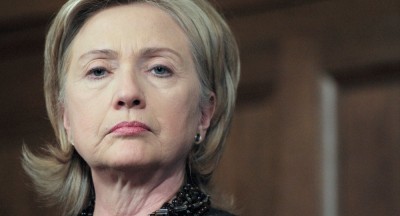Diagnosed with Pneumonia: What Happens If Hillary Clinton Has To Drop Out?

Hillary Clinton’s doctor now says the Democratic presidential candidate, 68, was officially diagnosed with pneumonia sometime on Friday, and has been campaigning with the serious respiratory illness for a week, leading to her “medical episode” at Sunday morning’s September 11th memorial event.
But what happens if the candidate’s health issues get more serious? Certainly, the Democrats always have the option of propping her up, Weekend at Bernie’s style, until after November 8th, but what if matters get progressively worse? Here’s a quick primer on where the Dems could end up:

When it comes to candidates (rather than office holders) the rules actually come from the political parties, not the Constitution. For Republicans, if a Presidential candidate dies or drops out, the RNC has to either convene a new convention or take an official poll of the RNC’s state representatives to select a replacement candidate. Most likely, the RNC would move the running mate up to the top of the bill, in order to preserve what fundraising has already been done for the ticket.
But for the Democrats, it’s not so clear. The Democratic National Committee reserves the right to replace a candidate who dies or drops out, and it doesn’t provide additional details in its by-laws. So presumably the Democrats would have to make up the process up as they go along. The DNC could entrust replacing Clinton to a central DNC brain trust or, more likely, replicate the RNC’s system, handing the vote over to the committee’s state delegates.
Tim Kaine
The DNC would likely want to retain the support of major donors who’ve already given to the Clinton-Kaine ticket, and would probably just bump Tim Kaine up from the Veep slot. Kaine would simply slide up the ticket, choose a new running mate, hope the ballots could be reprinted in time, and carry on just as Clinton had.
But, of course, this is 2016 and anything can happen.
The Open Slot
Donald Trump has proven to be a wild card candidate: he’s spent no money, compared to Clinton’s million-dollar ad buys, and raised virtually nothing compared to his Democratic opponents, and he’s still running neck and neck with Clinton nationwide. So the DNC would likely have to consider whether Kaine could retain Clinton’s razor-thin lead, or whether they’d need a more capable candidate.
The DNC might naturally lean towards Joe Biden who said he didn’t want to campaign, but has never said, openly, that he’d prefer not to be President. Biden is neither Clinton nor Trump, making him an easy favorite in the Presidential contest (though, it’s likely any number of cartoon characters, inanimate objects and D-list celebrities would also easily pull into the lead), and he’d have the backing of President Obama, who could unite the party with a call to action to unite behind his Vice President.
Also likely contenders:
Bernie Sanders and Elizabeth Warren (both progressive candidates with a large swath of support within the Democratic party), New York governor Andrew Cuomo, Virginia’s Jim Webb, even second runner up Martin O’Malley.
Chelsea Clinton
There’s a longtstanding tradition in American politics of spouses stepping in after an unexpected death. Take Missouri’s Jean Carnahan, for instance, who stood in for her husband Mel after he died in a plane crash three weeks before the Missouri Senate election. After Mel won posthumously, she served in the Senate for two years. Future Senator Olympia Snowe first entered politics after the death of her husband, a Maine state representative, in a car wreck. Likewise, Mary Bono’s long political career began when her husband Sonny died in a skiing incident.
Bill Clinton is prohibited by the 22nd Amendment of the Constitution from running. If a Clinton were to step in for Hillary, it would likely be Chelsea, who at 36 is just old enough, in terms of the Constitution, to be president.
The Filing Deadlines
Most states’ campaign filing deadlines have already passed – and as some independent candidates, including conservative Evan McMullin are finding, states aren’t normally open to extending the period of time candidates have to file the paperwork necessary to put their names on the Presidential ballot.
For the Democratic replacement, though, as long as they have the party’s blessing, it’s likely officials could simply replace Clinton name any time up to a month before election day (ballots are usually printed and mailed about three weeks before). It’s also possible that Congress could postpone or move election day, but that would be an extreme step.

